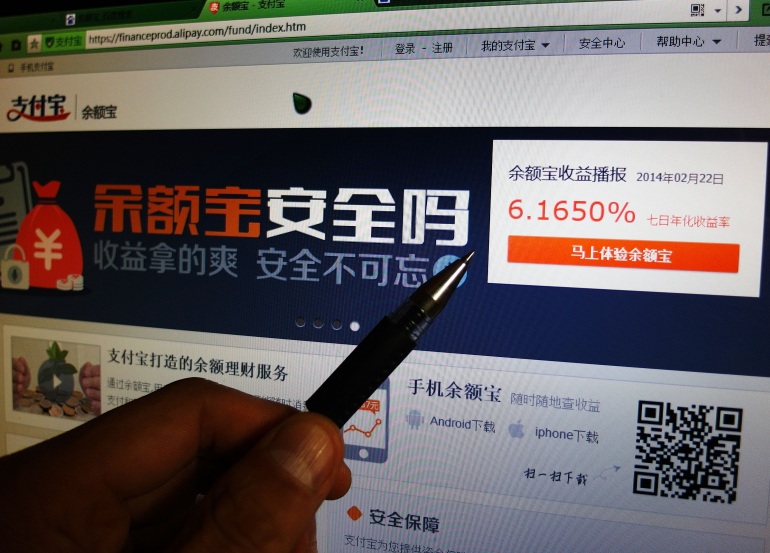Alibaba and the Chinese banking thieves

A netizen browses the website of Yuebao, the fund management platform under Alipay of Alibaba Group and Tian Hong Asset Management, in Yichang city, central Chinas Hubei province, 23 February 2014. AAP
Chinese state-owned banking behemoths – some of the largest lenders in the world – are under attack. Their assailants are not their foreign rivals or budding private players but the country’s internet giants, including Alibaba, Baidu and Tencent.
After the first round of boxing, the banks have been left bruised and scared. Alibaba’s online financial product Yuebao, which is managed by the company’s majority-owned Tianhung Fund, raised 250 billion yuan or $45 billion in less than seven months from a legion of depositors.
The size of the fund increased from 250 billion yuan to 400 billion yuan or $72 billion in less than a month. This is the kind of record that would make even the best of the Wall Street bankers or private equity financiers envious and is making Chinese bankers shake in their boots.
Let me explain to you why bankers are so scared.
For years Chinese banks have been able to enjoy lucrative returns on a guaranteed spread they earn from artificially controlled interest and deposit rates. They are able to suck in trillions of yuan in cheap funding from the world’s most diligent savers and in return pay them a pittance.
Then the vast pool of funding was channelled into China’s industrialisation effort, including building factories and infrastructure. State-owned enterprises are often the favourite recipients of cheap funding. Economists call this rigged system of squeezing depositors “financial repression.”
Long-suffering Chinese depositors have nowhere else to put their money into productive use, so they have to put up with banks. Returns on their money are often little better than stuffing cash under their mattresses.
Alibaba’s Yuebao, which debuted last June, fired the first salvo at the banks. The e-commerce giant, which sells more goods than Amazon and eBay combined, offers competitive interest rates to millions of online shoppers who have Alibaba accounts. It raised 50 million yuan on day one.
Chinese depositors are fleeing their banks at a record rate and Alibaba has been sucking in cash at a rate of three million yuan per minute, according to the managers of the Tianhung Fund, which runs Yuebao.
In order to stem the rapid outflow of money, the five largest state-owned Chinese banks have been forced to raise their own interest rates within the maximum band set by the central bank in rapid succession to fight back.
“The pressure of deposit fleeing is too great and we can’t control it. We have no option but to fight back,” said one banking executive, according to Caixin media, one of China’s top independent financial magazines.
Since June 2012, the central bank has allowed deposit-taking banks to set their own lending as well as saving rates within a 10 per cent range of the official cash rates. Medium and smaller banks have been forced to raise their deposit rates to the maximum ceiling, which is 10 per cent above official cash rates.
Initially, big state-owned behemoths could hold out but eventually the onslaught of internet giants like Alibaba forced them to contemplate the previously unthinkable – raising deposit rates to the highest ceiling allowed by the central bank.
“Our cost of capital increased from 0.35 per cent to 7 per cent and there is nothing we can do about it,” said the Chinese bankers according to Caixin.
Alibaba is not alone in exerting pressure on China’s banks. Baidu, China’s answer to Google, launched a similar product to Yuebao back in October last year. On the 28th of that month, Baidu’s new internet finance platform had a melt-down due to the huge number of visitors who scrambled to sign up to Baidu’s new product, which offers a 4.9 per cent annualised return.
Baidu raised the required amount – one billion yuan – within three hours.
Chinese internet giants have thrown down the gauntlet. Alibaba is unstoppable says one Chinese banker. When the company gets listed this year, it is tipped to raise more than $US100 billion. Its high valuation is partly due to its ground-breaking role in the emergence of internet finance in China.
Internet companies will hasten the pace of financial reform in China. The much-touted liberalisation of interest rates, which will spell the end of financial repression, will happen sooner on the back of the internet finance boom in China.
Beijing has so far tolerated it, and one can even say implicitly encouraged the development of the sector. The central bank sponsored Internet Finance Association has been approved and is expected to release industry self-regulation in the future.
Jack Ma, the founder of Alibaba and the Godfather of the internet industry in China famously said in 2008: “If banks don’t change, we will change them.”
In a little less than five years, Chinese banks are already fighting a rear-guard action. China’s internet industry – the most dynamic and least government controlled sector – is smashing industry cartels and challenging existing models.
Chinese banks will need to change or be changed.
















